Are Oil Prices to Blame for the Venezuelan Crisis?

Many analysts are venturing to link the crisis that plagues the Venezuelan economy with the fall in the price of crude oil. With oil being one of the most important commodity in Venezuelan production and the country’s main export product, it seems that the fall in the price would bring any country with an economic structure similar to Venezuela’s into a crisis. Similarly, many assume that the problems in Ecuador have the same root as those in Venezuela, although less pronounced.
Certainly, one of the markets that has seen the most movement lately is oil. The price of an oil barrel today is 50% less than what it was in mid-2014. The price increased 47% in 2016.
Venezuela’s export importance put into context
We intend to analyze how the fall of oil prices affected its major exporters, among them Venezuela.
From the viewpoint of exporting importance, it seems that there are many countries with net oil exports higher than Venezuela’s. In fact, Venezuela is the world’s 9th largest exporter. Russian exports almost triple those of Venezuela and Saudi exports are five times larger.
However, the important factor to analyze the economic impact of the fall of crude oil prices in exporting countries is not absolute exports; but rather it is the measure in terms relative to the size of the economy. If we consider the relative importance of oil exports as a percentage of GDP, Venezuela does not appear among the first places either.
In this case, Venezuela ranks 8th in relative export importance, far from the most important countries. Angola, Kuwait, and Iraq’s exporting importance more than triple that of Venezuela when it comes to oil.
The economic impact of falling oil prices
Both 2015 and 2016 have been difficult years for the economies of oil-exporting countries. After the price of oil barrels fell in the last quarter of 2014, economies dependent on black gold have suffered significant declines in economic performance, as was expected.
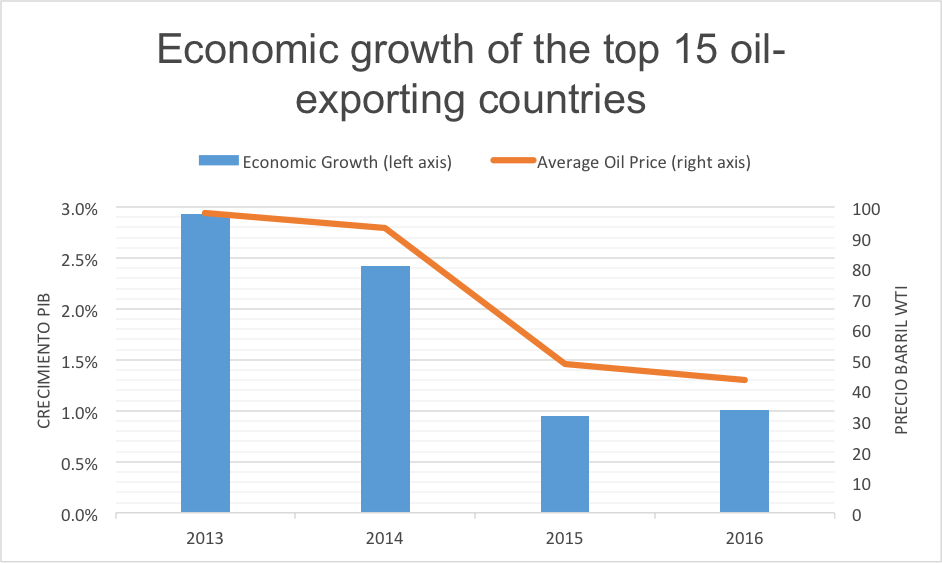
Source: IMF; FED St. Louis. The reported economic growth is an unweighted arithmetic mean of the 15 countries analyzed previously.
Although economic growth fell on average among all major oil-exporting countries, the impact of the fall of crude oil prices has been different in each economy. In theory, those economies more dependent on oil, such as Angola or Kuwait, would suffer the harshest declines in economic performance. However, the data does not support this thesis. Venezuela and, to a lesser extent, Russia have been the most affected.
The graph of economic growth by country shows two trends:
1 – The countries with less exposure to oil prices have less volatile economic growth.
This trend is expected. Therefore, we see how the left part of the graph—where the countries with less oil exposure are located—show less volatility in economic growth than those countries on the right side of the graph—countries with the highest exposure.
Those countries with less than 5% exposure to the oil market have been affected only slightly by the price of oil. The United Kingdom, Mexico, and Canada suffer to a lesser extent the falls in crude oil prices.
2- Countries with the worst economic performance are not those that have the most exposure to the oil market.
This trend is not what was expected. In this sense, two countries stand out: Venezuela and Russia. They are the only two countries that were in recession throughout 2015 and 2016; Russia being the 11th country with relative export importance and Venezuela the 8th.
The economic crisis is especially serious in Venezuela. It is the only country from the whole group that was in recession in 2014, 2015, and 2016. Moreover, Venezuela has the most serious recession with a 10% drop in GDP in 2015 (Nigeria fell by 1.7% and Russia only 0.8%).
If we compare Venezuela’s economic growth with that of other oil-exporting countries we can see the serious divergences that this article points out.
The true cause of Venezuela’s economic collapse
Venezuela is undergoing the typical collapse of a country that has been subject to years of all kinds of political interventions. The fall in oil prices is the external shock that brings to light the embarrassing result of years of price controls, currency controls, nationalizations, uncontrolled monetary creation, and economic dirigisme.
The economic imbalances that had accumulated over the years were hidden under the influx of dollars that incidentally came from oil revenues that grew in value, and not in volume. Lack of investment and low productivity per worker are the usual trend for Petroleum of Venezuela (PDVSA). The ability to increase production in order to counter the fall in oil prices is zero.
The Venezuelan government, which always lacked funds and didn’t receive any “help” from high oil prices at the time, did not hesitate to monetize all of the public debt necessary to cover its growing public expenditures without increasing taxes. This created hyperinflation in Venezuela. The population has even been forced to resort to bartering. The destruction of money means the destruction of the division of labor. In this environment, an annual fall of 10% GDP is perfectly understandable.
Price controls have completely depleted the commodities that are subject to such control, just as economic theory predicts. Having to trade food in the black market has radically increased the price of food. In 2015, the increase in food prices was over 130% in real terms (adjusted for inflation). This data only confirms the food emergency that Venezuela suffers.
Nationalized industries have become a disaster, to the extent that when oil prices fall the ability to rebuild Venezuelan industries and increase production in other areas is completely null. An ideal example is found in Venezuela’s steel production: after it was nationalized in 2008, steel production fell by more than 70%.
Venezuela and the embarrassments of the socialist paradise
In short, the Venezuelan crisis is anything but a crisis caused by the fall in oil prices. Not all oil-exporting countries are undergoing crises, and those countries that do suffer from a crisis do so much less severely than Venezuela.
The Venezuelan crisis has its roots in 21st century socialism and in the economic dirigisme that the political doctrine preaches. The fall in oil prices is nothing more than the event that uncovered the corpse of what used to be Venezuela’s economy.
Get our free exclusive report on our unique methodology to predict recessions

Daniel Fernández
Daniel Fernández is the founder of UFM Market Trends and professor of economics at the Francisco Marroquín University. He holds a PhD in Applied Economics at the Rey Juan Carlos University in Madrid and was also a fellow at the Mises Institute. He holds a master in Austrian Economics the Rey Juan Carlos University and a master in Applied Economics from the University of Alcalá in Madrid.
Get our free exclusive report on our unique methodology to predict recessions

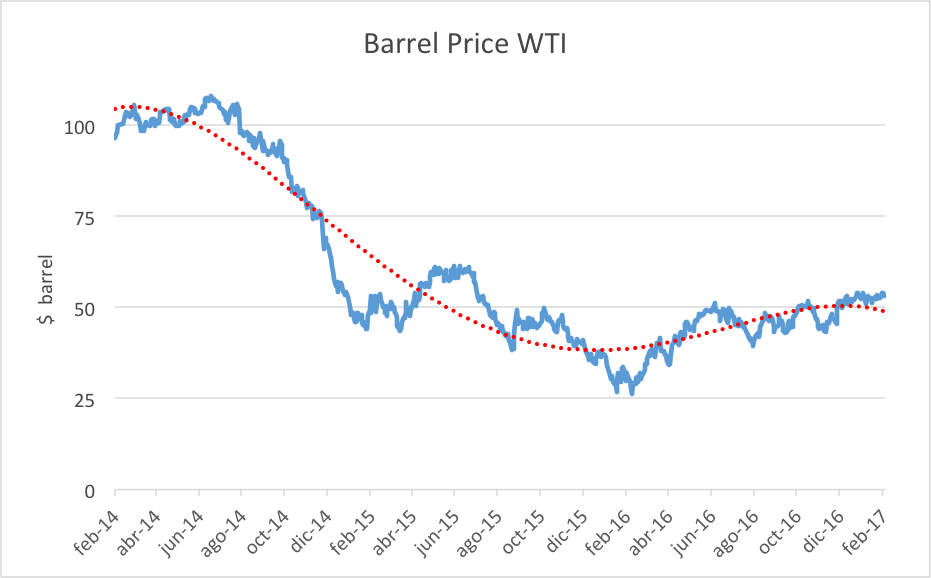
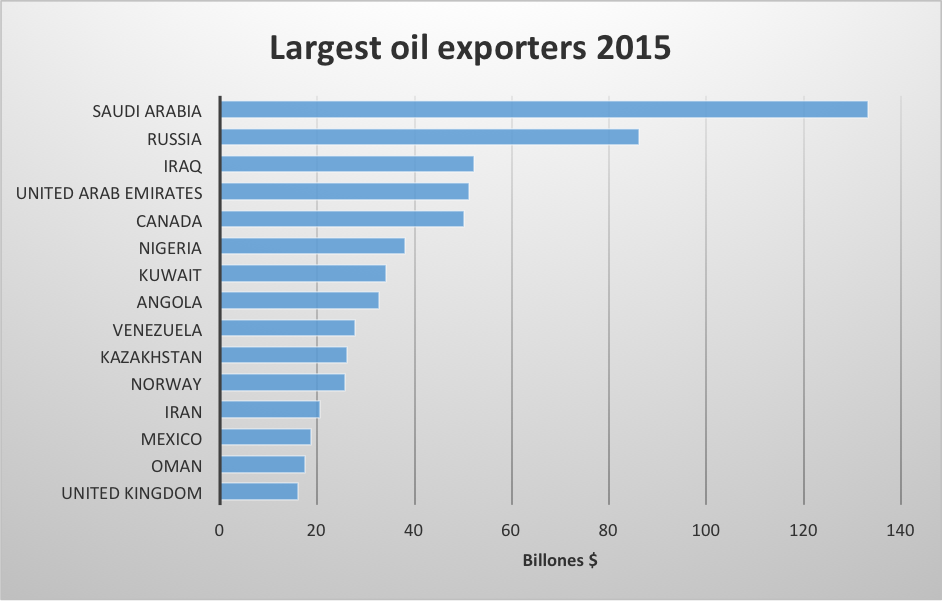
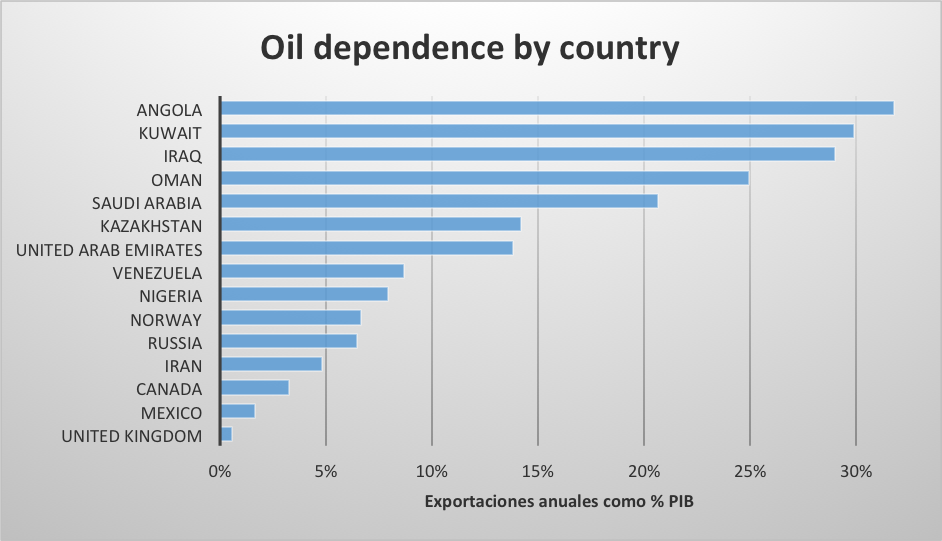
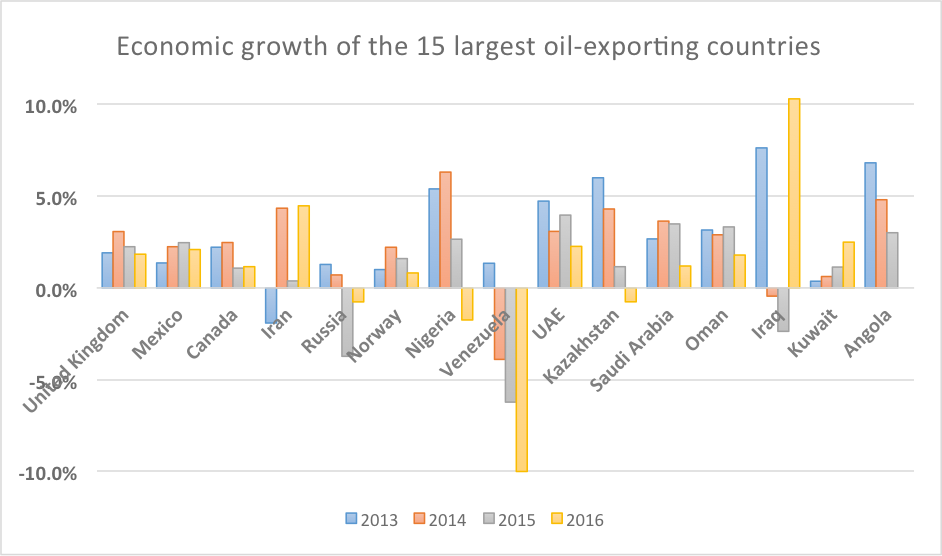


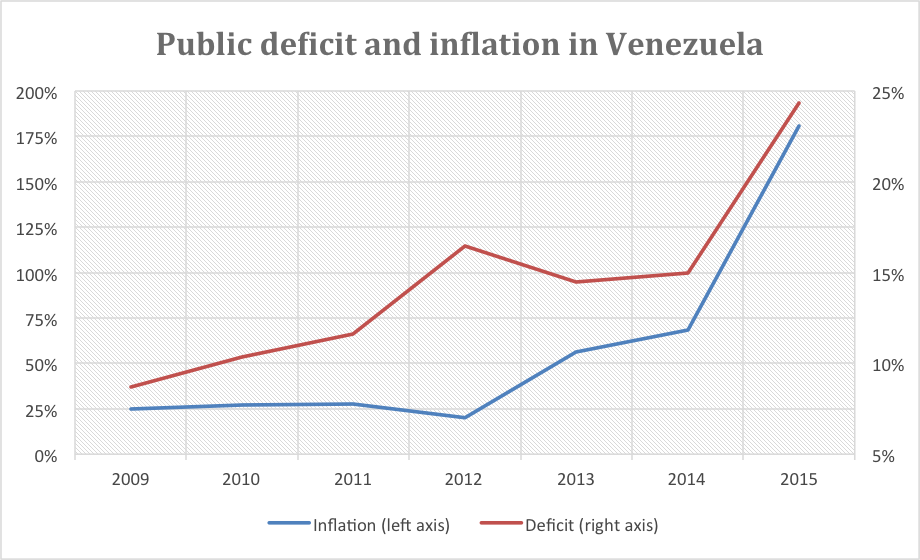

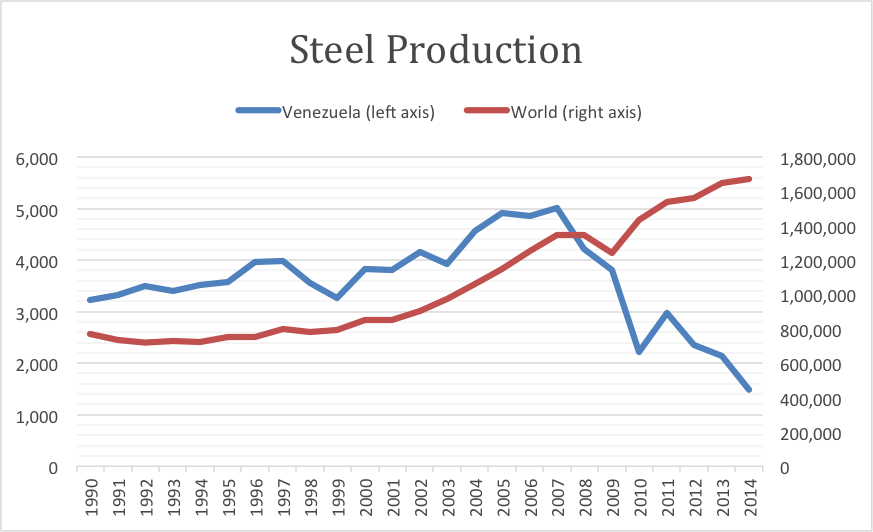


Basado en el titular, significaria que todos los demás países productores de petróleo, y que dependen en gran parte de dichos ingresos, deberían de estar pasando por las mismas o peores crisis ???.
Personalmente dudo que en Venezuela haya un factor del 10% entre las exportaciones petroleras y el PIB (GDP). Desconozco la cifra exacta, pero la cierta debe de ser mucho mayor ya que nuestro país depende para sus ingresos en muy alto grado de las ventas de petróleo.
I doubt that in Venezuela the oil export sales amount is only 10% of the GDP. It should be a lot higher. Unfortunately, our country income depends a lot of the oil export sales. This factor and the crazy and absurd government are the economical disaster causes.
El titular se presenta como pregunta, cuya respuesta es un rotundo NO.
Last paragraph- you mean 20th century socialism surely., since this mess was evident in 1996 when I obtained a British Council grant for a PDV geologist to study for a PhD in London after visiting the Bolivarian Republic. Industry professionals were persecuted and left. Venezuela is blessed with magnificent resources- avocado, banana, citrus, cocoa, coffee, coconuts, cherry, guava, mango, melon, pineapple plum, sugarcane, rum, vegetables, meat, fish, mountains, plains, rivers, beaches, forests, waterfalls, wildlife, gravel, sand, oil, gas, bauxite, , gold and other valuable minerals, sunshine, faith, culture, music, horses, cattle, birds and reptiles. Professionals now travel to Trinidad with an extra suitcase to fill with basic food items- flour, sugar- after the regime ended the rice- for- oil deal with Guyana, a much poorer state which it is claiming in a fit of greed and lust for land and oil. It failed to develop the Mariscal Sucre gas project initiated by Shell and killed tourism. The egregious violations continue and the UN, OAS and other supranational bodies funded by our taxes are impotent.
Well not really, the difference between 20th century socialism and 21th century socialism is the relatively well behaved 21th century socialism with regard to human rights. Both violate human rights, however the 20th century socialism made at a greater scale and was proud of it.
La producción de petróleo en Venezuela en 15 años de el actual gobierno ha caído en aproximadamente 1.5 Millones de Barriles Diarios diarios de petróleo equivalente (1.5 MM de BDPE); Aprox. 1 Míleon de barriles de petroleo+0.5 Millones de barriles de petróleo equivalente en Gas. Una cantidad impresionante de producción perdida y que a 90 $/barril promedio en 15 años es una cifra astronomica. Aun así la administración petrolera permaneció por mas de 10 años dirigiendola. Asimismo el trabajo de la gente del petróleo actual tiene baja productividad. No se ha podido sustituir personal talentoso despedido y no existe moral dentro de Directivos y trabajadores de PDVSA. El POTENCIAL DE PRODUCCIÓN se Redujo en 1 millón de barriles por día en estos últimos 15 años. La corrupción y el trabajo mal hecho por PDVSA ha llevado al fracaso a esa empresa y al pais.
An oil-based economy is inherently precarious, regardless of the exact type of economy. For example, where would Alaska or even Texas be if oil revenue suddenly dried up? The Venezuelan government made the mistake of making purchases of essentials, like food and medicine, dependent on oil subsides. A smarter strategy is to be able to care for basic needs without oil revenue. It looks like Saudi has finally begun to see that and is belatedly making some moves.
You can have the same effect for reasons other than oil. For example, Puerto Rico has subsidized utilities for decades, trying to woo outside investment that would bring money and prosperity. One proposal is even to become the colossus of off-shore banking; surely a tiny sliver of a trillion or so dollars would take care of Puerto Rico. Reality is that learned dependence on outside revenue has left a tropical island buying about 85% of all food consumed. What happens if planes don’t fly and ships don’t sail?
Why is Norway in better shape? The Norwegians did not make the mistake of making themselves utterly dependent on a windfall that might last only a few decades.